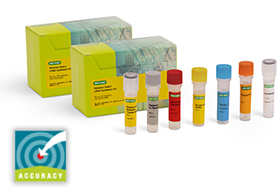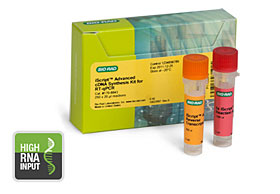Whatever your requirements, there is a Bio-Rad cDNA synthesis kit that meets your needs.
Overview of cDNA Synthesis
The synthesis of complementary DNA (cDNA) from RNA is an essential first step in many molecular applications. Gene expression analysis, pathogen detection, and genetic testing by real-time quantitative PCR (qPCR) or next-generation sequencing (NGS) are just a few examples of applications that require RNA to be transcribed into cDNA as an initial step. Accurate and precise results using these applications require high fidelity in cDNA synthesis so that the cDNA library accurately represents the original RNA transcripts. Two important considerations for choosing a cDNA synthesis kit are the reverse transcriptase enzyme and the priming strategy used to initiate the reaction. The choice of enzyme impacts the synthesis rate and reaction fidelity. Priming strategies influence what is transcribed in the reaction and, if not optimal, may result in a biased library that does not accurately represent the complete transcriptome.
Reverse Transcriptase Activity in cDNA Synthesis
Reverse transcriptases used in molecular biology are recombinant RNA-dependent DNA polymerases that catalyze the conversion of RNA into DNA in a first-strand cDNA synthesis reaction. This reaction produces an RNA-DNA hybrid double helix molecule. Reverse transcriptases have an RNase H domain with endoribonuclease activity that specifically degrades RNA when the RNA fragment is complexed with DNA. Degradation of RNA in an RNA-DNA complex ensures the RNA fragment can only be transcribed once, reducing transcription bias and ensuring reaction fidelity.
Most commercial reverse transcription kits utilize either Moloney murine leukemia virus (MMLV) reverse transcriptase or avian myeloblastosis virus (AMV) reverse transcriptase. MMLV has several advantages over AMV, most notably a lower error rate and higher processivity rate. Processivity refers to the number of consecutive reactions the enzyme can catalyze before releasing the RNA template. Though the RNase H activity of MMLV is lower than AMV, this is considered advantageous for molecular biology applications. High RNase H activity can result in product degradation leading to fewer full-length cDNA strands, particularly with long extension times.
cDNA Synthesis Priming Methods Affect Results
First-strand synthesis of cDNA utilizes either oligo(dT), random primers, or a combination of these strategies to prime the reverse transcription reaction. Priming a reaction with oligo(dT) initiates the synthesis preferentially at the 3’ end of the RNA fragment. If the RNA fragment contains a significant amount of secondary structure, the reaction may be prematurely terminated, resulting in fewer full-length transcripts and under-representation of the 5’ end of the fragment.
Random primers are oligonucleotide sequences of six or more bases. Each random primer has a different arrangement of bases, giving it the potential to anneal at many random points on an RNA transcript, ensuring complete coverage of the transcript. By varying the primer length instead of only using hexamers, the tendency to generate shorter cDNA fragments and a 3’ to 5’ bias can be avoided. A potential disadvantage of random primers is that they can lead to an overestimation of copy number in standard qPCR due to internal priming, which results in short, truncated sequences, which then become overrepresented in subsequent rounds of amplification.
Combining random primers and oligo(dT) overcomes the disadvantages of each priming mechanism as it takes advantage of priming from the 3’ end for fuller length cDNA transcripts and random priming for complete RNA coverage without a 3’ to 5’ bias.
Bio-Rad's High-Fidelity cDNA Synthesis Kits
Bio-Rad offers a full range of cDNA synthesis kits to fit specific application needs. The iScript cDNA Synthesis Kits feature an MMLV reverse transcriptase with RNase H activity in a formulation that has been optimized with a blend of oligo(dT) and random primers. These kits exhibit excellent performance across a broad range of input RNA and are ideal for constructing a cDNA library that accurately represents the original transcriptome. The Reliance cDNA Synthesis Kit features a novel chimeric enzyme engineered to overcome the processivity issues experienced with traditional reverse transcriptase, making this the ideal solution for challenging samples, such as degraded RNA from FFPE tissue samples or samples containing enzymatic inhibitors. Both kits are formulated with an optimized blend of oligo(dT) and random primers to increase the proportion of full-length product and minimize 5’ or 3’ bias. Both kits also have a sequence-specific priming option for gene-specific, high specificity applications and contain potent RNase inhibitors to prevent RNA degradation by the exogenous RNase activities.
Related Topics
High Capacity cDNA Reverse Transcription Kit, Thermocycler, Multiplex PCR, SYBR Green qPCR, SYBR Green Master Mix, PCR Master Mix, SYBR Green, Agarose Gel Electrophoresis, PCR Plastic Consumables



